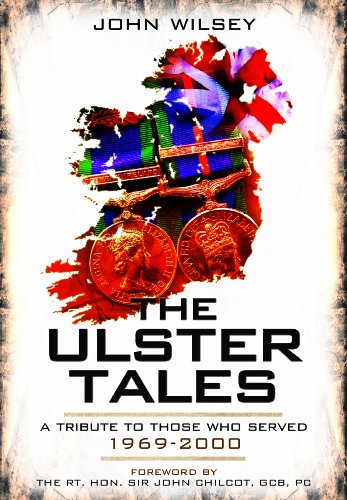The Ulster Tales: A Tribute to Those Who Served 1969–2000

“Among the plethora of books that cover this terrible period of Irish history, what makes The Ulster Tales one to be read? It is for the insight into the lives of the people who worked on our behalf to keep us safe. . . . a valuable piece of work.”
Anger, frustration, and suffering featured heavily in Ireland during the 20th century. No change there then, you might well say—consider the plantation land grab of the 17th century, the backlash in the 18th century, and the starvation and the potato famines of the 19th century. Sectarianism has stalked the beautiful Emerald Isle throughout history, but by the late 1960s, ingenuity combined with inhumanity—on both sides of the sectarian divide—to take the violence and hatred to new lows.
Often caught in the middle during this period known as “the troubles” were ordinary people—civilians, soldiers, police officers, and women. As a tribute to those caught up in the maelstrom, General Sir John Wilsey has written The Ulster Tales, a collection of stories that relays the authentic experiences of various individuals.
Having served seven tours of duty there, the author can clearly offer great insight into Ireland during “the troubles,” the years from 1969–2007 that saw the “longest continuous operation in British military history, spanning 38 years and in which over 250,000 served.”
The stories emanate from a diverse array of both civilians and public servants, including a soldier, a young journalist, a “spook,” and even a senior British politician. Each story engages the reader with some fascinating insights into the lives of those in whom we place our trust, both directly and indirectly.
The “soldier’s widow” for instance, who as the wife of a commanding officer in Ireland, made the journey to comfort the family of a soldier killed in a huge explosion at Warrenpoint, only to discover later that day that her own husband had been killed in a second explosion at that same scene.
The muddy waters that inevitably surround the work of military intelligence in these times are deftly illustrated with the tales from the “source handler” and “the spook.” The reader is given an insight into the conflict that arose between the different agencies involved.
To this day, there is still much talk of collusion between the intelligence community and the Loyalist paramilitaries—but that, as they say, is another story, and one that is yet to be fully told.
General Sir John Wilsey’s writing commands respect and belief. His unique position has allowed him access to sources and interesting material that he has communicated to the reader with all the gravitas and credibility that a very senior army officer commands.
The appeal of this collection of personal stories lies in the diversity of the roles and positions these men and women held down, with their backgrounds crossing the social and religious divides.
Yet somehow, they all have the same writerly voice in the telling. Rather than writing the stories from his own perspective, it might have been interesting if General Sir John Wilsey had instead edited the subject’s own words—or incorporated more direct quotes and insights from those who are still alive to tell their tales.
In the postscript, the author communicates a timely warning that “dissident republican groups . . . continue to pose a threat to Great Britain, and to Northern Ireland in particular.”
Recent events in Northern Ireland bear witness not only to this warning, but also the continuing presence of Loyalist paramilitaries. Organizations like the Ulster Volunteer Force (UVF) were responsible for some of the worst atrocities of “the troubles,” so it is surprising that the UVF does not even feature in the book’s index. As someone who has recently interviewed one of the UVF’s top men, this reviewer can attest to the organization’s continuing presence.
Among the plethora of books that cover this terrible period of Irish history, what makes The Ulster Tales one to be read? It is for the insight into the lives of the people who worked on our behalf to keep us safe. There is a strong sense that as well as being a tribute “to those who dedicated their lives to the fight against terrorism,” this book is also about leveling the pitch in the wake of the long-awaited truth about Bloody Sunday. (A civil rights demonstration in Londonderry on Sunday, January 30, 1972, resulted in the deaths of 14 unarmed civilians after the Army opened fire).